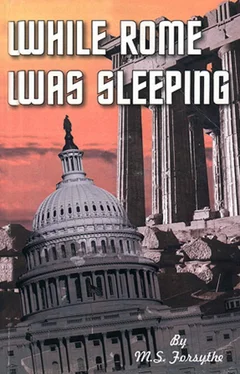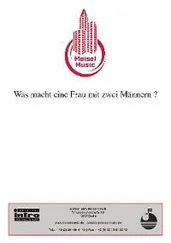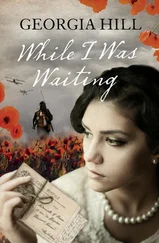“Yeah, for now.”
* * *
Andrew had arranged for a table in a quiet corner of the Athletic Club dining room. He wanted a place where the four of them could converse in relative privacy.
When he and Charlene arrived they found Evan already at the table. He stood as they approached and smiled at Charlene as Andrew introduced them.
“Evan Scott, this is Charlene Thayer.”
“It’s good to meet you, Mrs. Thayer. I knew your husband slightly.”
Father Ben arrived out of breath and apologizing.
Over dinner Evan began the conversation directed to Andrew and Ben “I received word today from Jim Savalza that it was confirmed that the weapon that he found was the one used in the murder. That being the case I have arranged for George’s body to be sent home for burial, and I plan to leave tomorrow.”
Father Ben said appreciatively, “I am glad that Mr. Kelshaw‘s body has been claimed for burial; I feel better knowing. Thank you, Mr. Scott.”
“He will be buried with honors, Father, and you’re welcome.”
Turning to Charlene he asked, “Mrs. Thayer, may I call you Charlene? We have some things to talk about.”
Before answering him directly, Charlene’s eyes met Andrew’s, who nodded his head slightly as if to say, go ahead, you can trust him. She looked back at Evan and said flatly, “I don’t really know who you are, Mr. Scott, if that is your name. I strongly suspect that you have some connection to the CIA since you obviously have a tie with George Kelshaw. You said you knew Paul; slightly, I believe is the word you used.”
“Actually, I work for the State Department, Mrs. Thayer—and George Kelshaw was a friend. We knew each other for a very long time. And, yes, I did know Paul Thayer… slightly. I will get into that shortly.
“I understand that there is a letter that George carried for you that was written by your husband prior to his death; a letter that speaks about being betrayed.”
Charlene had removed Paul’s letter from her bag and laid it on the table in front of her. Patting it slightly she responded, “I will let you read this letter, Mr. Scott. But before you do, you should know that this letter was written nearly a year after I was notified that Paul had been killed in Vietnam.”
“Yes, Mrs. Thayer, Charlene, I have been made aware of the discrepancy.”
“Discrepancy! I would call it a blatant lie!” She was angry. “The letter I have in front of me was written by my husband, from God knows where, and I have no doubt about its authenticity. I want to know what happened and why. Moreover, it should be equally important for the family of the poor soul buried in my husband’s grave to know what happened to their loved one.”
Everyone at the table was silent. Father Ben seated next to her patted her shoulder saying, “Yes, Charlene, this very important element cannot be overlooked,” he said gently trying to calm her.
Evan nodded understanding. “I’m sure you’re right. Hopefully as time goes on we will be able to do something about it. I would remind you, however, there are many MIAs and POWs, and many families still waiting and wanting word of what happened to their loved ones. There is not a day that goes by that I am not aware of that, Mrs. Thayer. May I read the letter from Paul?”
Embarrassed at her outburst, she nodded wordlessly sliding the letter across the table to his outstretched hand.
Andrew was waiting, thinking, “He didn’t tell her how he already knew about Thayer—is he going to, I wonder—”
He spent a few moments reading the letter and then folded it and looking at Charlene he handed it back saying, “Thank you and you are entitled to have as much of an explanation as I can give you.
“In the letter Paul mentions Pyotr Chernakov. General Chernakov was a national hero in the Soviet Union. He could easily have qualified as outstanding in Who’s Who in the world military community if such delineation had been made. As a young man he held all kinds of records as an athlete; later he became a brilliant military strategist and a top negotiator for the Kremlin.
“He was an Air Force pilot and at one time had been in the cosmonaut training program. During that time he acquired a viral infection that affected his ears. It took months for him to get over it, and by the time he recovered he had been scrubbed from the mission he had trained for.
“He graduated from Voroshilov General Staff Academy, the top Soviet military academy. This was a prerequisite for any appointment to important Ministry of Defense and General Staff positions. He climbed to the top, both in his career and in the Communist Party. He spent a great deal of time in China, North Vietnam and oddly enough in Cuba as well. There was even speculation in some circles that in time he might be in line for a significant political future. He was generally liked and respected by his adversaries and those with whom he served.”
Everyone at the table was listening intently. Andrew snapped his fingers. “I knew it!” he exclaimed quietly, thinking back to the letter. “It was the same Chernakov…”
“Please go on, Mr. Scott,” Charlene urged.
“In September of 1967 contact was made with our Embassy in Moscow regarding the possible defection of General Pyotr Chernakov and his wife Valeri.” Evan was choosing his words carefully. “This was almost unbelievable; almost too good to be true. So, of course, it took time to confirm that this was indeed genuine. And if genuine, it would also take time to make arrangements. “Before you ask, Andrew, we don’t know why or what determined Chernakov’s decision. We do know that he lost his wife in October of 1967, due to complications from pneumonia.
“Because of his high visibility this defection had to be handled very carefully with as few people knowing as possible. We knew Chernakov made regular trips to Hanoi and into Laos; it would have to be in that theatre where he would have an opportunity. We needed someone we could trust implicitly who knew the territory to meet and escort him to safe asylum. That was Paul and George Kelshaw, Mrs. Thayer—I can’t give you any more of the details, but we were certain he was the right man and circumstances of his current assignment, would dovetail with our decision.”
* * *
The dining room was all but empty now. Their waitress who had refilled their water glasses and coffee cups numerous times watched and waited quietly for the conversation to lag. When it did, she crossed the room to the table, graciously asking if there would be anything else. Declining anything more, Andrew took the check and signed his name and membership number. Everyone at the table was silent while he inquired if it would be all right if they remained at the table to talk for a while longer. The waitress said, “Certainly,” and moved quickly away, her starched black and white uniform rustling in the now quiet room devoid of the sound of other diners.
“Mr. Scott, you spoke about Paul’s assignment; he came home on Christmas Eve, 1968 and left the next day,” Charlene reminisced. She remembered opening the front door and seeing Paul with his arms full of red roses. “Hi, Charlie, Merry Christmas, darling…” She could hear his voice even now.
“He said he had just hopped a flight in and had to leave in the morning –I didn’t know and he didn’t say he had been in Washington or any reference to it—but then, of course, he wouldn’t, would he?”
“No, Charlene, he wouldn’t,” Evan confirmed.
“We never heard anything about Chernakov baling out of the Soviet Union. His defection would not look good for the USSR,” Andrew commented. “How did they handle it on the world scene?” he asked and then answered his own question. “But they didn’t have to, they had him killed.”
Читать дальше












